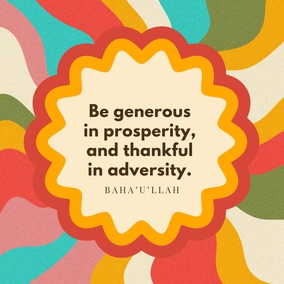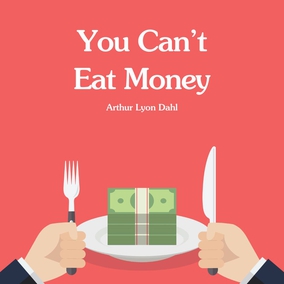The views expressed in our content reflect individual perspectives and do not represent the authoritative views of the Baha'i Faith.
The whole world knows that virtue consists in the subjugation of one’s passions, or in self-renunciation… – Leo Tolstoy
This classical idea—self-renunciation—has somehow retreated from our modern consciousness. Instead of renouncing our selves, we seem to want to help our selves, or discover our selves, or improve our selves. Much popular psychology emphasizes the self, but doesn’t encourage us to go beyond it.
As a result of that singular focus on the self, the world has witnessed a huge boom in what experts loosely call the self-help sector or the self-improvement industry: infomercials; self-help books, audiobooks and websites; holistic institutes; motivational speakers; seminars and conferences; personal coaching; online education, etc., etc. In the United States alone, the self-help sector has become a $10 billion business. One out of every ten books sold focuses on self-help. If you buy one of those books, you can unearth the secrets to a great relationship, discover daily joy and lasting fulfilment, achieve maximum weight loss, find career success and stop worry and anxiety from ruining your life. Or not.

Friedrich Nietzsche
Actually, the self-help sector runs on a big quotient of hype and not much actual science. Very little of the advice offered by the self-improvement industry has undergone any scientific testing or validation. In some cases, the new-age “remedies” offered by popular self-help methods rely on simple nostrums or generalizations like “positive thinking” or “the law of attraction” as surefire ways to get everything you want in life.
This contemporary focus on the self, which some call “selfism” or “self-worship,” probably came initially from Friedrich Nietzsche and Max Stirner, the German philosophers who extolled explicitly selfish principles as desirable and natural. The idea reached its popular peak via the work of the Russian-born American novelist and materialist philosopher Ayn Rand, who rejected religion and altruism in favor of her “objectivist” philosophy, based primarily on what she called “rational self-interest.”
So: should we emphasize and worship the self; or try to renounce and transcend it? This question has become one of the chief controversies in modern psychology and philosophy.
From a Baha’i perspective, rational self-interest, rather than a selfish pursuit, involves escaping the prison of self:
O My Servant! Free thyself from the fetters of this world, and loose thy soul from the prison of self. Seize thy chance, for it will come to thee no more. – Baha’u’llah, The Hidden Words, p. 36.
Regarding the statement in The Hidden Words, that man must renounce his own self, the meaning is that he must renounce his inordinate desires, his selfish purposes and the promptings of his human self, and seek out the holy breathings of the spirit, and follow the yearnings of his higher self, and immerse himself in the sea of sacrifice, with his heart fixed upon the beauty of the All-Glorious. – Abdu’l-Baha, Selections from the Writings of Abdu’l-Baha, p. 206.
The Baha’i teachings, like all of the great Faiths, present the foundational concept of renouncing the self as a path to spiritual maturation. For Baha’is, renouncing the self doesn’t mean asceticism or strict self-denial—instead, it means mastering the human ego, and turning the naturally selfish desires of our lower nature toward our higher nature’s more humanistic, altruistic and selfless ideals:
With reference to what is meant by an individual becoming entirely forgetful of self: the intent is that he should rise up and sacrifice himself in the true sense, that is, he should obliterate the promptings of the human condition, and rid himself of such characteristics as are worthy of blame and constitute the gloomy darkness of this life on earth — not that he should allow his physical health to deteriorate and his body to become infirm. – Abdu’l-Baha, Selections from the Writings of Abdu’l-Baha, p. 179.
This moderate Baha’i ideal calls for detachment and selflessness—not abandoning the comforts and pleasures of the material world entirely. In fact, Baha’u’llah’s writings recommend striking a careful balance between our appreciation of the world and our determination to transcend it:
Know ye that by “the world” is meant your unawareness of Him Who is your Maker, and your absorption in aught else but Him. The “life to come,” on the other hand, signifieth the things that give you a safe approach to God, the All-Glorious, the Incomparable. Whatsoever deterreth you, in this Day, from loving God is nothing but the world. Flee it, that ye may be numbered with the blest. Should a man wish to adorn himself with the ornaments of the earth, to wear its apparels, or partake of the benefits it can bestow, no harm can befall him, if he alloweth nothing whatever to intervene between him and God, for God hath ordained every good thing, whether created in the heavens or in the earth, for such of His servants as truly believe in Him. Eat ye, O people, of the good things which God hath allowed you, and deprive not yourselves from His wondrous bounties. Render thanks and praise unto Him, and be of them that are truly thankful. – Baha’u’llah, Gleanings from the Writings of Baha’u’llah, p. 275.
Next: Religion and the Self: How Do I Stop Being Me?
You May Also Like
Comments

















Thanks again for posting those gems. Neitzsche has others that I appreciate, especially his denunciation of those who steal Judeo-Christian virtue, but deny the need for the Supreme Being that gifted them.
As the song says:
These humanists having the form of Godliness but denying the Origins.
"I teach you the Superman. Man is something to be overcome. What have you done to overcome man? All beings hitherto have created something beyond themselves: and you want to be the ebb of that great tide, and would rather go back to the beast than overcome man?..."
"Man is a rope stretched between the animal and the superman- ...a rope over an abyss. A dangerous crossing, a dangerous looking back, a dangerous trembling and halting. What is great in man is that he is a bridge and not a goal."
"I teach you the Superman. Man is something to be overcome. What have you done to overcome man? All beings hitherto have created something beyond themselves: and you want to be the ebb of that great tide, and would rather go back to the beast than overcome man?..."
"Man is a rope stretched between the animal and the superman- ...a rope over an abyss. A dangerous crossing, a dangerous looking back, a dangerous trembling and halting. What is great in man is that he is a bridge and not a goal."